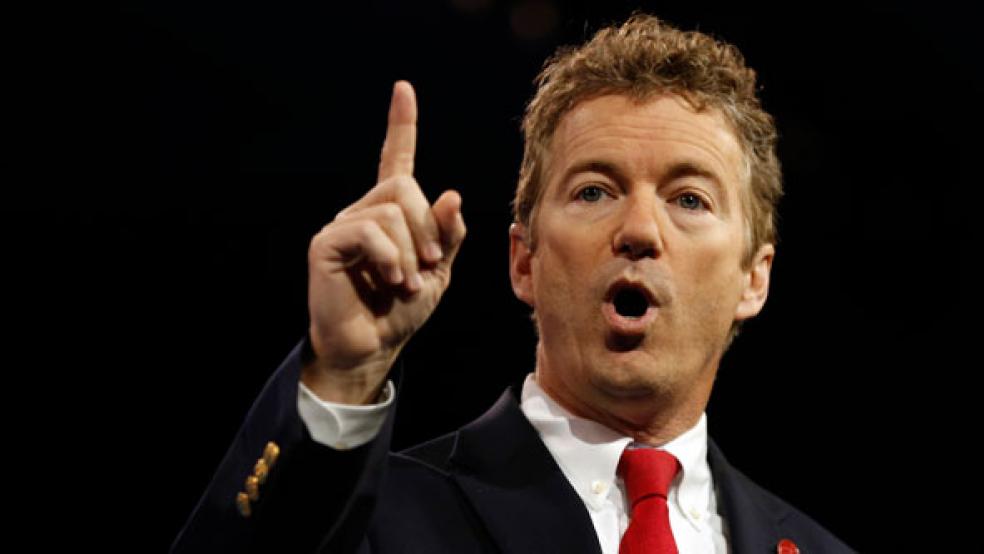Just named to Time Magazine’s 100 most influential list (Sarah Palin wrote the effusive blurb about him), Senator Rand Paul of Kentucky said this week he’s considering running for the White House in 2016.
The Tea Party favorite and son of libertarian hero Ron Paul says the increased visibility he gains from being a presidential prospect allows his views to resonate on a wide range of issues. “I want to be part of the national debate, so whether I run or not, being considered is something that allows me to have a larger microphone,” he said at a Wednesday breakfast sponsored by The Christian Science Monitor.
The nearly 13-hour Senate filibuster that Paul pulled off in March contesting the Obama administration’s use of drones to kill suspected terrorists – plus Paul’s surprise straw-poll win during the Conservative Political Action Conference (CPAC) earlier this year, when he just edged out Florida Senator Marco Rubio – have catapulted the 50-year-old ophthalmologist into the national spotlight. Last February 13, Paul delivered the official “Tea Party” response to President Obama’s state of the union speech, and this May, he’ll deliver the keynote address to the Iowa State Republican Party.
“Paul’s strongest point is that he has an understanding of the American conservative movement and how to articulate it,” Craig Shirley, a Reagan biographer, told The Fiscal Times. “He is the first politician since Gingrich and before that, Reagan, who has a philosophical framework for making populist conservatism into a popular governing framework.”
Paul said he’ll be visiting the early primary states shortly – “I’ll be in Iowa, in New Hampshire this spring. I think I’ll also be in South Carolina in the summertime – so we’re considering it. We won’t make a decision until 2014,” he said Wednesday.
As much as Paul excites conservatives with his smaller government, let’s-disengage-from-foreign wars stance, he has also raised the ire of liberals for some of his comments on gun-control legislation. On Wednesday he said that President Obama was using some of the victims of the horrific school shootings in Newtown, Connecticut, as “props” for advancing his gun control agenda.
“When I see the father(s) and the mothers and them testifying — and I know they’re coming voluntarily, and they want to come and be part of this debate — but it still saddens me just to see them. And I think that in some cases the president has used them as props. And that disappoints me,” he said Wednesday, according to The Washington Post.
He added that “a lot of things in Washington are window dressing, it’s a dog and pony show, it’s a parade, it’s theatrics, it’s histrionics, all to show people that something bad happened – which it did, something terribly tragic happened.” But he added that “none of the proposals would have addressed the tragedy.”
As the first-term senator continues to attract attention, here are a few other noteworthy facts about him:
He wants “to reduce the income tax and if possible, eliminate the income tax... The first thing you do is balance the budget, then reduce the size of government.”
He’s a government ombudsman: “[It’s my job to] keep an eye on what our government is up to. As a conservative, I have grave concerns that our government has become completely out of control… Many Americans don’t realize it, which I’m quite sure is completely fine with many elected officials. It’s not ‘fine.’ It’s infuriating.”
Paul told a group of Orthodox Jews in Brooklyn, NY that it was a "mistake" to topple Saddam Hussein in Iraq and later wage war in Libya.
He’s offended by government abuse of power: “Whether by coincidence or design,” he also says in his 2012 book, Government Bullies, “since EPA regulations began taking property, jobs, and businesses away from citizens, unemployment in America has increased by 33 percent. This abuse of power by the implementation of regulations infringes upon all Americans’ basic rights, whether or not some of us are ever directly affected by their rules.”
He would “send Roe v. Wade back to the states.”
He’s opposed to institutional racism, he has said, and “I would’ve, had I been alive at the time, I think, had the courage to march with Martin Luther King to overturn institutional racism, and I see no place in our society for [it].”
He is extremely leery of sending American troops to fight in any global hotspots without very careful congressional oversight: On the Senate floor in March 2011, he said he told his constituents that “when I first ran for office, the most important vote I would ever take would be on sending their men and women — the boys and girls, the young men and women in my state — or anywhere else in the United States — to war. To me, it’s an amazing thing that we would do this so lightly, without any consideration by this august body – to send our young men and women to war without any congressional approval.” He was referring to U.S. participation in enforcing a no-fly zone over Libya.
A surgical ophthalmologist, Paul is a graduate of Baylor University and the Duke University School of Medicine. He specializes in cataract and glaucoma surgeries, LASIK procedures, and corneal transplants.
In high school in Texas, he was on the swim team and played defensive back on the football team.
Paul is married and has three sons. His wife, Kelley, has managed payroll and marketing communications for her husband’s surgical practice in Bowling Green, Kentucky.
In 1994 Paul founded Kentucky Taxpayers United, an anti-tax organization that encouraged politicians to pledge publicly to vote uniformly against tax raises.
Paul has said he’s a “huge fan” of the anti-tax pledge engineered by Grover Norquist that a number of Republican lawmakers have signed over the years. In the fall of 2012 during the heat of negotiations on how to resolve the fiscal cliff, Paul said on Fox News, “I think [politicians] should be reminded they took a pledge to the voters in their states. They campaigned on it, they said they weren’t raising taxes. They said that is what we believe in.”
He received a skeptical reception at Howard University a few days ago when he spoke about the GOP’s efforts to appeal to a diverse array of Americans. “Some have said that I’m either brave or crazy to be here today,” he told the audience of faculty and students. “I come to Howard today, not to preach, or prescribe some special formula for you, but to say I want a government that leaves you alone.... If you hear me out, I believe you’ll discover that what motivates me more than any other issue is the defense of everyone’s rights.”
He believes in immigration reform and in a path to citizenship. In response to those who have accused him of being for “amnesty,” he says this country’s current policies are actually “de facto amnesty... We have 11 million people here that have been here, some of them for a decade or more,” Paul told Fox News last month. “No one is telling them to go home. No one is sending them home.”






